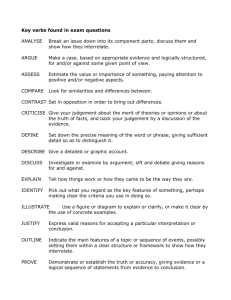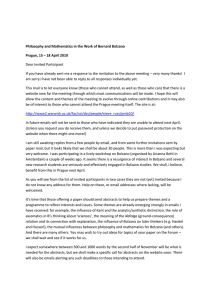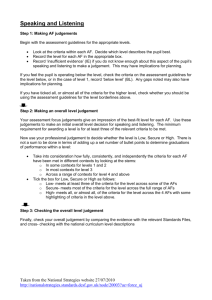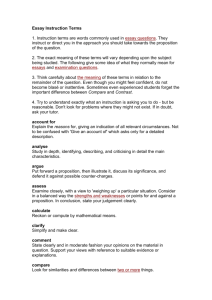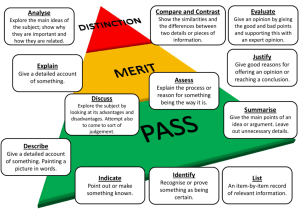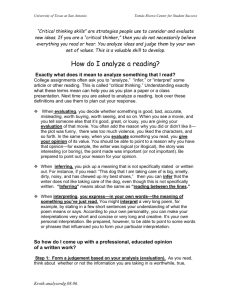Bolzano on Judgement and Error
advertisement
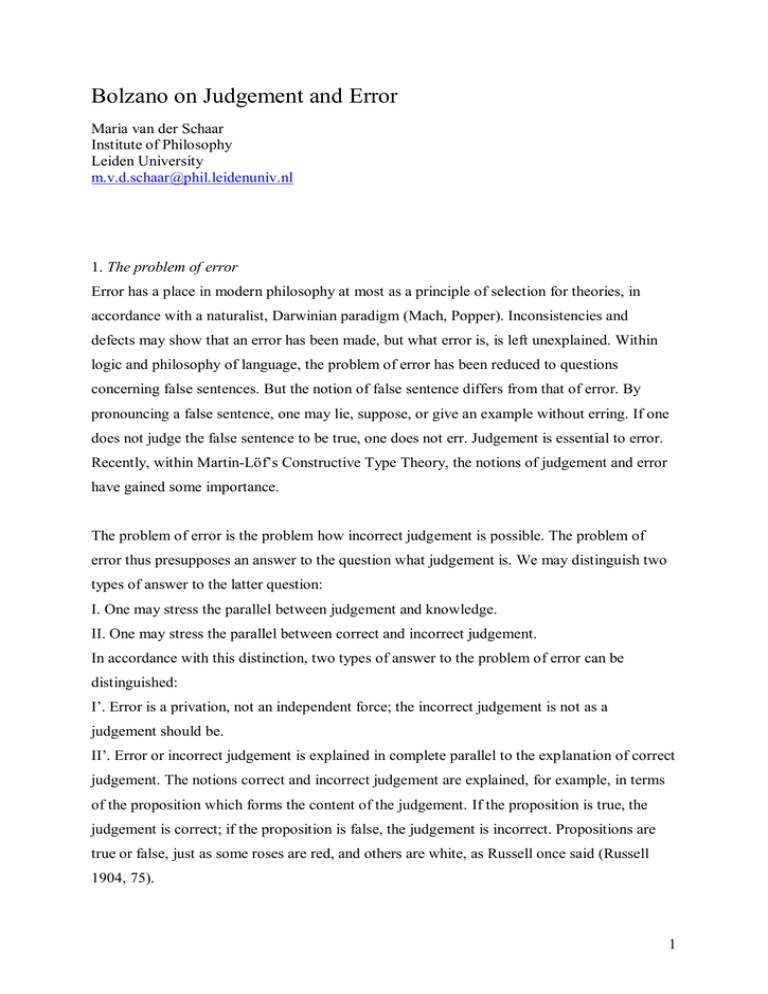
Bolzano on Judgement and Error Maria van der Schaar Institute of Philosophy Leiden University m.v.d.schaar@phil.leidenuniv.nl 1. The problem of error Error has a place in modern philosophy at most as a principle of selection for theories, in accordance with a naturalist, Darwinian paradigm (Mach, Popper). Inconsistencies and defects may show that an error has been made, but what error is, is left unexplained. Within logic and philosophy of language, the problem of error has been reduced to questions concerning false sentences. But the notion of false sentence differs from that of error. By pronouncing a false sentence, one may lie, suppose, or give an example without erring. If one does not judge the false sentence to be true, one does not err. Judgement is essential to error. Recently, within Martin-Löf‟s Constructive Type Theory, the notions of judgement and error have gained some importance. The problem of error is the problem how incorrect judgement is possible. The problem of error thus presupposes an answer to the question what judgement is. We may distinguish two types of answer to the latter question: I. One may stress the parallel between judgement and knowledge. II. One may stress the parallel between correct and incorrect judgement. In accordance with this distinction, two types of answer to the problem of error can be distinguished: I‟. Error is a privation, not an independent force; the incorrect judgement is not as a judgement should be. II‟. Error or incorrect judgement is explained in complete parallel to the explanation of correct judgement. The notions correct and incorrect judgement are explained, for example, in terms of the proposition which forms the content of the judgement. If the proposition is true, the judgement is correct; if the proposition is false, the judgement is incorrect. Propositions are true or false, just as some roses are red, and others are white, as Russell once said (Russell 1904, 75). 1 Answers of type I‟ have the advantage that they explain the asymmetry between correct and incorrect judgement. Correct judgement is related to what is, Reality; incorrect judgement is not so related, and is thus due to mere appearance. But if one stresses the asymmetry too much, error becomes impossible. As Socrates says in the Theaetetus (189a), to judge what is not is to judge nothing, which is not to judge at all. The advantage of answers of type II‟ is that error is clearly made possible; it is as real as correct judgement. The disadvantage is that the asymmetry between correct and incorrect judgement threatens to disappear. Such a theory has to answer the question: what is it that makes some propositions true, which is absent in the case of false propositions? Balduin Schwarz, in his article on „Irrtum‟ in the Historisches Wörterbuch der Philosophie, only mentions „the important analysis‟ of error given by Bolzano. In the less known third part of the Wissenschaftslehre (1837), the „Erkenntnislehre‟, there are several chapters on judgement, knowledge and truth, with a special section on error. Besides the logical / conceptual question how error is possible, Bolzano also asks the epistemic / psychological question what the causes of error are, how error may arise in us. The conceptual question is more fundamental than the epistemic one. What makes Bolzano‟s thoughts on error of importance is that both objective notions, such as that of a proposition, and notions that relate to the judging person, the notion of act of judging and cognitive act, play a role in his answer to the conceptual and the epistemic question. With respect to the concept of error, one has to distinguish between act and product. „Error‟ and the German term „Irrtum‟ stand for the product, resulting from an act of erring („das Irren‟). Such an act of erring can be determined only after an error as product has been pointed at. The distinction is a special case of the distinction between the act of judgement and the judgement product. Both act and product need to be distinguished from the proposition, which Bolzano also calls an „error‟ if it is false but held true. Because Bolzano explains error primarily as incorrect judgement (WL, I, § 36), the question what judgement is comes first (section 2). To understand the concept of error, one also needs to understand what knowledge is (section 3). In my analysis of Bolzano‟s notions of judgement and knowledge I have profited from Mark Siebel‟s two recent articles on these topics (Siebel 1999 and 2004). In section 4, Bolzano‟s concept of error will be dealt with. 2. Bolzano on judgement and belief 2 In modern philosophy the notion of judgement has been replaced by that of belief, which replacement creates at least two problems. Judgement is an act, whereas belief is a state, and the replacement has thus led to a neglect of the act of judging. Bolzano, though, explains the notions of opinion, knowledge, error and inference in terms of the act of judging, and rightly so, I think. The other problem is that the term „belief‟ is highly ambiguous. It may stand for: (having an) opinion, the state of mind in which one holds a proposition to be true; the degree of confidence with which one holds a proposition to be true; or faith, that is, trust in God, a person or a doctrine. Bolzano makes a distinction between these notions, introduced an appropriate terminology, and also gives an explanation of holding true a proposition. In the first part of the Wissenschaftslehre (WL, I, § 34), Bolzano takes the act of judgement („eine Handlung unseres Geistes‟) to be what is common to assertion (as act), opinion and faith. An act of judgement has a Satz an sich, a proposition, as its matter (Stoff; the term „Inhalt‟ has a different meaning in Bolzano‟s work; for systematic reasons I will use the term „content‟ instead of „matter‟), which is independent of the act of judging, of language and of space and time. In contrast to a Satz an sich, the act of judgement is dependent upon the judging mind, in space and time, and it may stand in causal relations, because it is real (wirklich). According to Bolzano, the Satz an sich is not the result of an act of setzen. The proposition is not to be identified with the judgement product, for the latter is dependent upon the act of judging (WL, I, § 20, p. 82). Bolzano opposes a theory of judgement of type I, namely Kant‟s theory, in which judgement is explained in terms of knowledge: “Das Urtheil ist die mittelbare Erkenntnis eines Gegenstandes” (KdrV, A 68; cf. WL, I, § 35, see further Schaar 2003). According to Bolzano, such an explanation applies only to correct judgements; besides, it contains a circle, because knowledge, according to Bolzano, has to be explained in terms of judgement. According to Bolzano, a judgement is correct, if the proposition that is its content is true; if the proposition is false, the judgement is incorrect. Bolzano‟s theory of judgement is thus of type II: the explanation of the incorrect judgement is parallel to that of the correct judgement. Unlike Russell (1904), Bolzano gives an account of what makes a proposition true: “our judgements are true if we connect with our presentation of a certain object the presentation of such a property [the object] really (wirklich) has.” (WL, I, § 42, p. 180). One may add, the judgement or proposition is false, if the object does not really have the relevant property. Bolzano is thus able to give an explanation of the asymmetry between truth and falsity. This 3 explanation of error is preliminary to the more extended explanation given in the third part of the Wissenschaftslehre. All notions for which we now use the term „belief‟ indifferently, Bolzano explains in terms of the act of judgement. We hold true („are consistently committed to‟, sind fortdauernd zugethan) a certain proposition M, consisting of a subject-presentation S and a predicatepresentation P, if we judge that S is P as often as the presentations S and P, or the question whether S is P, come to our mind (WL, III, § 306, p. 200). In order to exclude cases of holding true for vacuous reasons (when the presentations S and P never come to our mind and we never judge that S is P), we need to add a clause. Mark Siebel (1999) proposes to add that one has to have passed the judgement that S is P at least once. This clause is in accordance with Bolzano‟s explanation of holding true, for Bolzano presupposes in his explanation that we remember a judgement as one that we have passed before (§ 306, p. 200), and it is also in accordance with Bolzano‟s explanation of holding true in § 307 (p. 208). The extra clause forces one to say that someone who can calculate does not hold true that 2156 > 1, if he has never passed the judgement 2156 > 1. In such a case one has the capacity to judge that 2156 > 1, but one does not hold true that 2156 > 1. The state of holding true has a certain duration: one holds true the proposition M as long as one stands in the above-mentioned relation to its subject-presentation S and predicate-presentation P. One‟s opinion (Meinung) is, according to Bolzano, a Satz an sich that one holds true, whether that proposition be true or false, and whether the degree of confidence be weak or strong (§ 306, p. 200). The degree of confidence (Zuversicht) pertaining to a judgment made is to be distinguished from its liveliness that the judgement owes to the liveliness of the presentations that form its parts. We may have a strong degree of confidence in religious truths without having a lively presentation of them (§ 293, pp. 112, 113). The highest degree of confidence is perfect certainty (vollkommene Gewissheit). If one practically denies the possibility of the opposite of one‟s judgement, the degree of confidence is called conviction (Überzeugung, sittliche Gewissheit, § 319). The degree of confidence with which one judges is determined by the probability of the corresponding proposition (see below). We will see in the next section that the concept of justification plays no role in Bolzano‟s explanation of the concept of knowledge. What is important for him, though, is the question how judgements arise in us, which is preliminary to the question how error arises in us. 4 Judgements arise by mediation of other judgements or they arise immediately (§ 300). Certain judgements of perception (This is something red) and certain pure conceptual judgements count as immediate judgements (WL, I, § 42, p. 181). Mediated judgements, or judgements caused by other judgements, are the result of an act of the mind through which one goes over (übergehet) from the judgements A, B, C, D to the judgement M, which act is called an inference (ein Schliessen, ein Folgern, § 300, p. 123). The relation of the judgement M to the judgements A to D is a relation of mediation (Vermittlung), when no other judgement than A to D is needed in order to judge M. In such a case one says that the judgements A to D are the complete cause of the judgement M (This does not mean that if I have made the judgements A to D, I also will judge M, for there has to be a certain activity of the mind). According to Bolzano, there are exactly three ways in which a mediated judgement may arise in us (§ 300, p. 126). The three relations between mediated and mediating judgements are defined in terms of objective relations between Sätze an sich. I will use [A] for the Satz an sich that functions as the content of the judgement A. a) The contents of the judgements A to D forms the objective ground of the content of M. The relation between the Sätze an sich [M] and [A] to [D], in case the latter is the objective ground of the former, Bolzano calls a relation of Abfolge, which is always a relation between true Sätze an sich (cf. WL, II, § 198). The ground of a true proposition forms the reason why that proposition is true. The proposition that the temperature rises is a ground of the truth that the thermometer rises, but not the other way round. Our knowledge of the truth of [M] is caused by the knowledge of the truth of [A] to [D] and by our insight in this Abfolge relation. b) The content of judgement M is deducible (ableitbar) with respect to certain substitutable parts i, j (Vorstellungen an sich) from the contents of the judgements A to D, if every substitution of those presentations in each of the propositions by another presentation that makes the propositions [A] to [D] true, also makes the proposition [M] true. (Bolzano presupposes that [A] to [D] and [M] are compatible, that is, certain substitutions make them all true.) For example, from the proposition [Cajus is a man] the proposition [Cajus is mortal] is deducible with respect to the presentation [Cajus] (WL, II, § 155, p. 120), because every substitution of the presentation [Cajus] in both propositions by another presentation that makes the former proposition true, also makes the latter true. But if we also take the presentation [man] as substitutable part, the relation of deducibility between the two propositions, with respect to the presentations [Cajus] and [man], does not obtain, for [God is 5 almighty] is true, whereas [God is mortal] is false. If there is a deducibility relation, the judgements A to D may cause the judgement M. c) The content of M has a degree of probability > ½ (Wahrscheinlichkeit) relative to the contents of the judgement A to D (with respect to certain substitutable parts). It is presupposed hat [A] to [D] are compatible. The degree of probability can be determined by taking the number of cases in which one goes over through substitution from true propositions [A] to [D] to a true proposition [M] and divide it by the number of cases in which one obtains through substitution true propositions [A] to [D] (WL, II, § 161, p. 172). Deducibility is a special case of the relation of probability, namely when the degree of probability is maximal, that is, 1. As we will see in the last section, the relation of probability is of special importance for the question how error may arise in us. According to Bolzano, there are only these three ways in which a judgement may arise in us. In those cases where M does not seem to follow from A to D in one of these ways, the judging person has tacitly added as premise the incorrect judgement that from the propositions [A] to [D] one may infer the proposition [M] (WL, III, § 300, pp. 129, 130). The degree of confidence of a judgement M in relation to the judgements A to D is determined by the probability of the proposition [M] in relation to the propositions [A] to [D]. When the probability of a certain proposition is 1, because it may be the content of an immediate judgement or because it may be inferred from such a judgement, the degree of confidence of judgement M is 1, which means that the confidence is perfect. If the degree of probability of a proposition [M] in relation to [A] to [D] is μ, and one judges A to D with perfect confidence, then the degree of confidence with which one judges (if one judges) M is the remainder that the probability of [M] has over the probability of the negation of M, that is, μ ─ (1 ─ μ). The degree of confidence in M may be negative or 0, for example, when the probability of [M] is ½ , in which cases we do not judge M (cf. WL, III, §§ 318 – 320). 3. Bolzano on knowledge The German language makes a distinction between Erkenntnis and Wissen. Erkenntnis is the product of an act of Erkennen, that is, cognition is the product of an act of cognizing. Bolzano‟s term „Wissen‟ may be translated as „certain knowledge‟, because of the cognate term „gewiss‟ („certain‟), or it may be translated as „scientific knowledge‟, because of the cognate term „Wissenschaft‟. According to Bolzano (WL, I, § 36), cognition is a judgement that contains a true Satz an sich. Cognition as product of an act of cognizing does not exist 6 independently of that act, according to Bolzano (WL, III, § 307). In part III of the Wissenschaftslehre Bolzano considers the explanation given in part I too narrow: anyone who is at the present moment not judging a certain truth, could not be attributed cognition of that truth. A cognition, Bolzano says in part III, is a state of the mind pertaining to a person P, if (§ 307, p. 207; cf. Siebel 1999, p. 77): (a) P has once passed the judgement J; (b) J has a true proposition as its content; (c) P is able to remember the judgement J; (d) P still holds true the corresponding proposition. Comparing this to the modern explanation of knowledge as justified true belief, we may note two differences. Bolzano‟s explanation of cognition does not contain the notion of justification, and Bolzano holds that there is no state of cognition unless it is preceded by an act of judging. In contrast to Siebel, I judge the latter difference an advantage of Bolzano‟s explanation of cognition over the modern one. Bolzano understands that an explanation of cognition needs to account for the obtainment of knowledge. Bolzano has a concept comparable to that of justification, namely that of cognitive ground (Erkenntnisgrund). The judgement that the thermometer rises is the cognitive ground of the judgement that the temperature rises, if we know that the temperature rises because we have passed the judgement that the thermometer rises. Cognitive grounds are, in contrast to objective or proper grounds, judgements, and they need not be true. If the cognitive ground does not have the objective ground of the conclusion as its content, Bolzano says, it is merely a subjective cognitive ground of the conclusion; if it does, it is called its objective cognitive ground (§ 313). The concept of cognitive ground is not part of Bolzano‟s explanation of cognition, probably because he considers that concept to be too psychological. Neither is the concept of objective ground part of the explanation of cognition. Bolzano explicitly says that a cognition may be the result of pure luck, and that it may be mediated by false judgements (§ 314, pp. 232, 233). No Gettier problems for Bolzano‟s notion of cognition. Bolzano also does not use the concept of objective ground to explain the notion of scientific or certain knowledge (Wissen). Certain knowledge is a state of the mind with respect to its own judgements. We have certain knowledge of a truth [M], when the confidence which pertains to the judgement M appears to us in such a way that we are not able now to destroy it (§ 321). Bolzano does 7 have a name, though, for those correct judgements of which we also know the objective ground: these acts of cognition are called understanding (Begreifen oder Einsehen), and the corresponding pieces of knowledge are called clear insights (deutliche Einsichten) (§ 316, pp. 259, 260). There is an important reason why the notion of objective ground does not form part of Bolzano‟s explanation of certain or scientific knowledge. This reason can be found in the section on the Kantian question whether there are any limits to our faculty of cognition (§ 314 and § 315). If there were such limits, there would be unknowable truths, Bolzano says, but how can we know that there will not be a man in the future that knows such a truth? According to Kant, metaphysics, which deals with questions concerning God, soul, immortality and freedom, is not a science. There is not one truth concerning these topics that is undisputed and not doubtful; these questions lie beyond the limits of knowledge. According to Bolzano, the propositions that there is a God, that God is immutable, and that no simple substance perishes through time, are part of metaphysics. Although people have disputed what the proper ground is of those propositions, no one doubts that they are true (§ 315, p. 249). Although metaphysics is not perfect regarding the scientific order of its truths, and although we are not able to give the first grounds of this science, that does not imply that we cannot have certain, scientific knowledge concerning the objects of metaphysics. Even the most perfect science such as mathematics is wanting in its first grounds. Which book on geometry is able to give an explanation of the concepts of space, line or body? If the notion of objective ground would be part of the explanation of scientific knowledge, no science would pass the test. 4. Bolzano on error As we have seen in the first section, Bolzano explains error in the first part of the Wissenschaftslehre as incorrect judgement, and an incorrect judgement is a judgement whose content is a false Satz an sich. In the third part of the Wissenschaftslehre, Bolzano improves upon this explanation of error: An error is a false proposition that a person holds true (§ 307, p. 208). Making a comparison with the explanation of cognition given in the former section: point (a) also holds for error, see (a‟) below; (b‟) and (d‟) have „false‟ where (b) and (d) have „true‟, and (c) (we are able to remember judgement J) is missing in the explanation of error. Essential to error is thus: 8 (a‟) a person P once has passed the judgement J; (b‟) J has a false proposition as its content; (d‟) P still holds true that false proposition. There is an important difference between error and cognition: whereas cognition is a mental state, an error is a false proposition held true. Bolzano makes it clear, though, that the false judgement products may also be called errors (§ 307, p. 207). According to Bolzano, error is possible because there are false Sätze an sich, and because we may judge false propositions to be true. How is it possible that we mistake a false proposition for a true one? According to Bolzano, we cannot err regarding immediate judgements. His argument is that if we doubt one, we have to doubt them all, and everything that is derived from them, because they all arise in a similar way, which is not a particular good argument, for we should doubt the disputed ones, whereas there is no reason to doubt the others. We can also not err, Bolzano says, regarding judgements that are derived from immediate ones, and whose propositions are related by probability 1 (unless the chain of inferences becomes very long, so that we have to rely on memory, cf. § 309, p. 214). If the premises are true, an inference brings us to a new truth (§ 309, p. 212). And the same may be said concerning a judgement M in relation to the judgements A to D, when the propositions [A] to [D] form the objective ground of [M] (§ 301). We may at most say that our faculty of inference (that is, our faculty of cognition) is limited, so that we do not know every true proposition that follows from known premises (§ 308, p. 211). Again, how does error arise in us? What is the Irrtumsquelle? It cannot be a separate faculty besides the faculty of cognition that makes us err. According to Locke, the faculty of knowledge is infallible. He is thus in need of a separate faculty of judgement to explain error. But, according to Bolzano, it cannot be the case that we have a cognitive faculty that God is deprived of: God is not wanting in any sense (§ 301, p. 137). Neither is it man‟s will that makes him err, as Descartes thought (§ 310, p. 220). Dependent upon the will is at most our attention, which directs us to certain presentations, but not the judgement itself (§ 291, p. 110). Neither is it true that to err is a form of sinning, as it is thought within the Augustinian tradition in general, or that it is a form of precipitation (over haste, § 310, p. 223). The astronomer, who after careful calculations predicts a moon-eclipse in a hundred years on a certain day, whereas the eclipse holds off because a comet passes by, makes an error, but there is no precipitation. 9 According to Bolzano, it is the limitation of our faculty of cognition (which is the same as the faculty of judgement) in which we differ from an omniscient being. In finite beings, the faculty of judgement works in judgements with perfect confidence, and in judgements with imperfect confidence (§ 301, p. 137). And it is only with respect to judgements with imperfect confidence that we may err. Only with respect to probabilities do we judge with imperfect confidence. Certainly not the immediate judgements; they have the maximum degree of confidence. A proposition [M] that has a high degree of probability (with respect to certain propositions, and with respect to a substitutable part of those propositions) will in a real life situation be judged by us as being in fact true, with a degree of less than perfect confidence corresponding to the degree of probability of the proposition. If the proposition is in fact false, we have made an error. The error is not made when the degree of probability is attributed to the proposition [M]. For example, if there are 90 black balls and 10 white balls in an urn, the probability of the proposition that a black ball will be drawn is 9/10, but we do not err if we judge the proposition to have that probability. The possibility of error arises, as soon as we expect, and thus judge it to be true without a probability qualification, that a black ball will be drawn. To err in such a case, Bolzano says, is a psychological necessity; we are not free to withhold our judgement (§ 309, p. 213). All our empirical judgements are judgements concerning probabilities. The judgement that the sun will rise tomorrow is the result of a probability inference. As soon as we expect and judge that it is true that the sun will rise tomorrow, the possibility of error arises, for the content of that judgement is only very probable (in relation to the content of our former judgements, that is, our experience). “Every error is a proposition, which has, in relation to the other propositions that the erring person holds true, a certain probability.” (§ 309, p. 214) The probability that pertains to every error (false proposition) Bolzano calls the appearance (der Schein) of that proposition (the German term for probability is Wahrscheinlichkeit). The appearance of a proposition may find its origin in propositions that are all true, in which case the error is called original, or it may arise from false propositions. In the example of the urn with 90 black balls, if we judge it to be true at t 0 that a black ball will be drawn at t 1; and if at t1 a white ball is drawn, we clearly have made an error (incorrect judgement product). The probability that the false proposition has, with respect to the propositions that there are 90 black balls in the urn and 10 white balls, is its appearance (§ 309, p. 214). Because of this probability the proposition appears to us to be true, but it is not really true; it is false. If the probability of a proposition, in relation to certain others, is less 10 than ½, we will not err, because we withhold our judgement (although we may err if we judge the negation of that proposition). 5. Conclusion The problem of error is primarily a conceptual problem. Bolzano‟s answer concerning the question how error is possible focuses on the question what the content is of an incorrect judgement. Error in its objective aspect is a false proposition, and there is a parallel between the explanations of cognition and error. Bolzano‟s answer is thus of type II‟. The problem of error also has an epistemic variant: it concerns the genetic question how an incorrect judgemental act may arise in us. According to Bolzano, error in its subjective aspect is due to our limited faculty of judgement, which means that we often have to judge with a less than perfect degree of confidence. This answer seems to be of type I‟: error arises from privation. Probability, which is an objective property of Sätze an sich, is essential to the question how error may arise in us, because a proposition with a greater degree of probability appears to us to be true without probability qualification, whereas it might be false. Essential to error is that a proposition appears to us as true whereas it really is false. This use of the distinction between appearance and reality confirms the presumption that Bolzano‟s answer concerning the epistemic question is indeed of type I‟. References Bolzano, Bernard (1837) Wissenschaftslehre, Leipzig, 1929 / 1930. Russell, Bertrand (1904) „Meinong‟s Theory of Complexes and Assumptions‟ in B. Russell, Essays in Analysis, D. Lackey (ed.), London, 1973, 21-76. Schaar, Maria van der (2003) „Opinion, Assertion and Knowledge: Three Epistemic Modalities‟ in The Logica Yearbook 2002, T. Childers & O. Majer (eds.), Prague, 259-268. Siebel, Mark (1999) „Bolzanos Erkenntnistheorie‟ in Bernard Bolzanos geistiges Erbe für das 21. Jahrhundert, E. Morscher (ed.), Sankt Augustin, 59-96. Siebel, Mark (2004) „Bolzanos Urteilslehre‟ in Archiv für Geschichte der Philosophie, 86, 5687. 11 12

